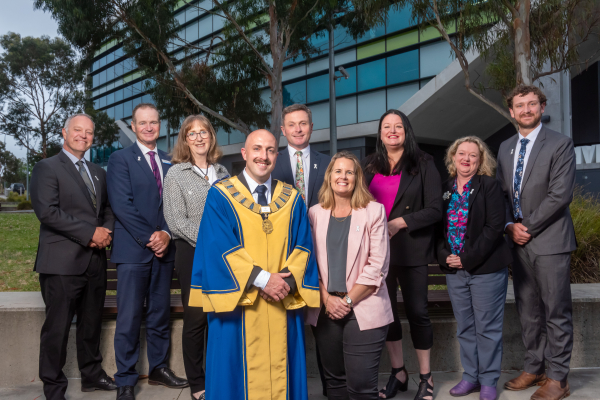More than 50 high-school principals, guidance counselors, students and leaders from community-based organizations gathered at Cornell Tech Feb. 28 to discuss how to grow Cornell’s Bridges Scholars from a recruiting and enrollment pilot program into a national collaborative aimed at improving the diversity of students pursuing science and engineering degrees.
Unlike traditional college recruiting programs that compete for students based on standardized test scores, Bridges Scholars takes a more collaborative, qualitative approach, working strategically with partners to identify prospective students early in their high-school careers. The program admits cohorts of students from the same high schools and community-based organizations, giving them a familiar support system once they arrive at Cornell, and provides services to mitigate the barriers typically faced by minority and first-generation students.
Bridges Scholars enrolled 15 students at Cornell during the pilot version, launched in 2019 by Scott Campbell, executive director of admissions and recruitment for the College of Engineering. Campbell developed the program as a way to improve diversity recruiting through partnerships with key high schools with advanced math and science curriculums and STEM-related extracurricular offerings.
Destiny Nwafor
“It takes it out of this competitive recruitment model and builds a community of people where you’ve got this ecosystem from ninth grade right through college graduation, and you’re working with the students at every step of the way,” said Campbell, who credited Kevin Johnson ’88, a member of the Cornell Engineering College Council, with helping to develop and support the program.
Addressing summit attendees, Johnson said he was inspired to get involved because his father, a first-generation engineering student, taught him that education has an immediate and lasting impact on a family and community.
“The numbers are incredibly persuasive about why this needs to become the normal way of thinking and the normal way of recruiting,” said Johnson, who added that a scaled-up version of Bridges Scholars involving more high schools, colleges and universities could have ripple effects across the country. “There’s going to be a lot of energy and momentum around this, and it’s our job to keep it going.”
Some of the summit’s most persuasive arguments for growing Bridges Scholars came from students and alumni of the College of Engineering. Six students and recent alumnae gave firsthand accounts of how the student support through Diversity Programs in Engineering (DPE) and a variety of student organizations encouraged and provided a support network during their time at Cornell.
Bridges Scholars will complement the existing work of DPE, partnering Engineering admissions and DPE with key high-school and community organizations to reach more students.
Biomedical engineering student Barakat Abdul ’24 said she had not considered an engineering education until she was introduced to it through a computer science program at the Young Women’s Leadership School of East Harlem.
“I didn’t really know what it meant and I hadn’t heard of computer science,” Abdul said, “and then my senior year was a complete shift. After doing Girls Who Code, I was really interested and wanted to see where I could take it.”
Destiny Nwafor ’21, a software engineer at Microsoft, spoke about the Cornell programs and communities that ultimately helped her feel like she belonged.
“Professors [Jamol] Pender and [Hakim] Weatherspoon were so instrumental to me, just seeing them, having time with them, and them encouraging me,” Nwafor said. “Having adults as well as peers, and building a support system from the ground up in a place where it could be few and far between.”
Campbell said he plans to continue working with summit attendees to grow Bridges Scholars’ partners, financial aid, student services and summer prep opportunities. Through the program, 22 new students have been selected to enter Cornell in the fall, and they’ll be receiving support through a new Bridges Scholars staff position established within DPE.
“As more institutions become engaged in this process,” Campbell said, “we’ll have a direct impact on a much broader group of students, not just the ones we’re immediately working with at Cornell.”
Syl Kacapyr is PR and content editor for the College of Engineering.








